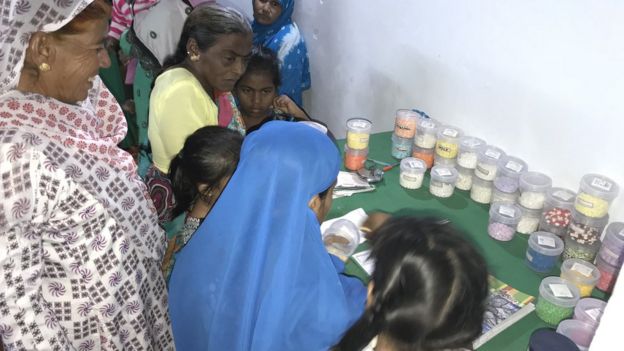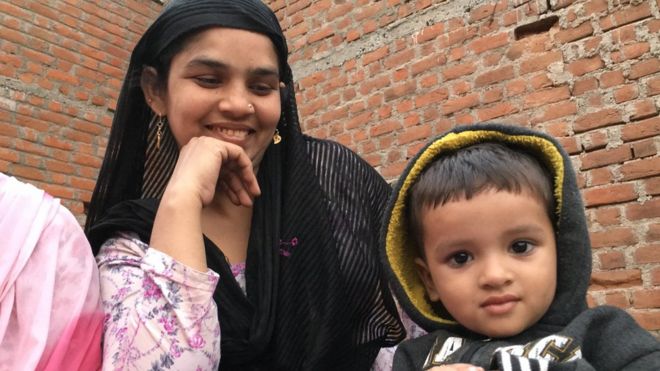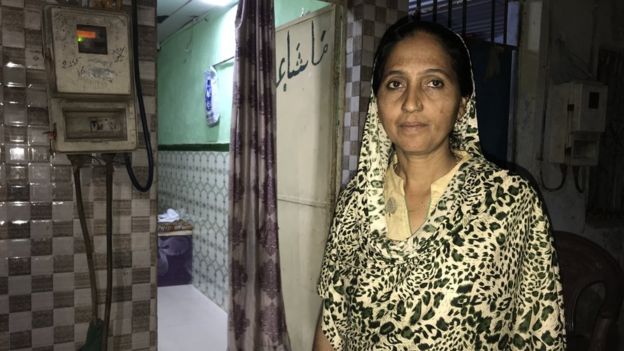When we reached the limits of the city of Ahmedabad, there was a mountainous image. It is part of the city's debris. Reshma Abba is living between its very close smoke and odor.
In Citizen city, resettlement families, including families resettled, are living in 100 families.
I met Rashmi Abba at 6 pm outside Rahat Hospital in Citizen. This hospital was built by the help of social activists and is the only hospital in the area. The state did not contribute to this. Rashmi Abu, displaced from the Naroda Bhatia area in Ahmedabad, said, "After the riots the government did not do any assistance. There is nothing like school, hospital, employment. This is what we got for 15 years. We will not run this time, "he says.
Here, single houses are lined up. Each house has two rooms and an electric meter outdoors. There is no facility for drainage.
Though there is a government school in three kilometers away, there are no transport facilities.
Abrar Ali Sai, who was financed by the doctors for the Rahat Hospital, was 22 years old when the 2002 riots took place. When the riots broke out, he ran away from his house in Ahmedabad and fled many times in search of security.
Abrar is currently a professor at the University of Ahmedabad. Abrar says that he has learned the lesson of the past 15 years, not to believe any party, but to believe in the people.
"It is clear that the BJP government is discriminating Hindus and Muslims after 2002. The Congress Party was responsible for the division of the people in the 1980s. Even now Rahul Gandhi did not meet Muslim leaders, "he said.
There are 36 families affected by the riot in a 4-hour journey from Ahmedabad.
The government did not set up this place too. Iqra Azlam Shikri, a 17-year-old girl, has completed her schooling. He studied in a Muslim community run school.
"Five years ago, the media and political leaders arrived. But nothing has changed. What should you talk to? What will this happen? "Says Igra.
Rahat hospital:
 Many of these families have escaped from Vadodara. Some of them work as a tailor and work for a daily work in a factory producing factory.
Many of these families have escaped from Vadodara. Some of them work as a tailor and work for a daily work in a factory producing factory.
'Rahath Hospital
Houses are smaller than houses in Citizen. Sameera Hussein says that men go to the field at night and sleep.
Sameera married an order from the IDP family. He has no choice.
He has studied up to the eighth grade. He said that Muslim women had studied so much before the riots. Now he has a ten year old daughter and a son.
"No party has helped us. No relief, no home. The future of children, education, skills and employment opportunities is a problem, "he says.
Muslim women are aware of their strength after the riots, says Wakar Kasi.
"The fear of Muslim men after the riots has spread. The police started to deal with relief groups, justice and work. "
The Muslim community and organizations have made it possible.
Abrar, who helped the hospital in Citizen, wants to make some arrangements for education.
Many non-Muslims help such efforts, "says Abrar. That is why he has asserted on the belief that politics has worsened over the last 15 years.
Rashmi Abba
In Citizen city, resettlement families, including families resettled, are living in 100 families.
I met Rashmi Abba at 6 pm outside Rahat Hospital in Citizen. This hospital was built by the help of social activists and is the only hospital in the area. The state did not contribute to this. Rashmi Abu, displaced from the Naroda Bhatia area in Ahmedabad, said, "After the riots the government did not do any assistance. There is nothing like school, hospital, employment. This is what we got for 15 years. We will not run this time, "he says.
Here, single houses are lined up. Each house has two rooms and an electric meter outdoors. There is no facility for drainage.
Though there is a government school in three kilometers away, there are no transport facilities.
Abrar Ali Sai, who was financed by the doctors for the Rahat Hospital, was 22 years old when the 2002 riots took place. When the riots broke out, he ran away from his house in Ahmedabad and fled many times in search of security.
Abrar is currently a professor at the University of Ahmedabad. Abrar says that he has learned the lesson of the past 15 years, not to believe any party, but to believe in the people.
"It is clear that the BJP government is discriminating Hindus and Muslims after 2002. The Congress Party was responsible for the division of the people in the 1980s. Even now Rahul Gandhi did not meet Muslim leaders, "he said.
There are 36 families affected by the riot in a 4-hour journey from Ahmedabad.
The government did not set up this place too. Iqra Azlam Shikri, a 17-year-old girl, has completed her schooling. He studied in a Muslim community run school.
"Five years ago, the media and political leaders arrived. But nothing has changed. What should you talk to? What will this happen? "Says Igra.
Rahat hospital:
 Many of these families have escaped from Vadodara. Some of them work as a tailor and work for a daily work in a factory producing factory.
Many of these families have escaped from Vadodara. Some of them work as a tailor and work for a daily work in a factory producing factory.'Rahath Hospital
Houses are smaller than houses in Citizen. Sameera Hussein says that men go to the field at night and sleep.
Sameera married an order from the IDP family. He has no choice.
He has studied up to the eighth grade. He said that Muslim women had studied so much before the riots. Now he has a ten year old daughter and a son.
"No party has helped us. No relief, no home. The future of children, education, skills and employment opportunities is a problem, "he says.
Muslim women are aware of their strength after the riots, says Wakar Kasi.
"The fear of Muslim men after the riots has spread. The police started to deal with relief groups, justice and work. "
The Muslim community and organizations have made it possible.
Abrar, who helped the hospital in Citizen, wants to make some arrangements for education.
Many non-Muslims help such efforts, "says Abrar. That is why he has asserted on the belief that politics has worsened over the last 15 years.
Rashmi Abba


Comments
Post a Comment